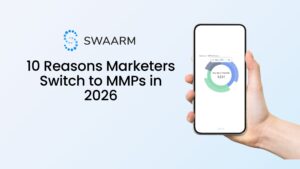In 2022, global revenue from apps and games decreased by 3%. In cash terms, that’s $129 billion. Faced with this decline in customer spending, app owners should, therefore, be doing more than ever to maintain profitability. One of the best ways of staying in the red is by using a mobile measurement partner (MMP) for mobile app tracking.
What is a mobile measurement partner? How does it help in mobile app tracking?
To scale up your mobile app, you need to make data-driven decisions, which is where mobile attribution platforms, aka MMPs, come in. They can assist you in both collating data as well as in analyzing and optimizing the results. This crucial information can subsequently help you make the most critical strategic decisions concerning your ad campaigns. Through this, you will know which ad campaigns are performing well and achieving the best results.
Mobile measurement providers use different technologies to work in tandem to track and attribute mobile events, such as app installations, clicks, revenue, and engagement. For attribution, MMPs use a process called “server-to-server connection,” also referred to as “software development kit” (SDK), to integrate a mobile measurement platform with a mobile app.
Ultimately, the goal of a mobile app analytics and attribution partner is to help you understand your return on investment (ROI) across the various ad campaigns you are running, enabling you to optimize their performance.
Now that we understand how MMPs work, we will go over the merits of partnering with a mobile measurement provider that already has its own mobile app analytics platform versus using an in-house web development team to create your own.
Managed Mobile measurement partners (MMP)
Pros
Expertise and specialization
Mobile measurement partners are highly specialized professionals with unique expertise. With a clear focus on mobile analytics, they stay up-to-date with the latest industry trends and cutting–edge methodologies. In a nutshell, they offer clients access to the most advanced tools available for mobile app tracking.
As such, these partners often provide unparalleled insights into mobile user behavior, allowing their customers to make informed decisions that drive growth and success. By working with a mobile measurement partner, businesses can gain a competitive edge in an ever-changing and increasingly complex mobile landscape.
Affordable
Rather than investing huge sums in developing an in-house mobile attribution platform yourself, MMPs offer you access to their cutting-edge services via subscription models. In turn, this will reduce your initial outlay and save you money. And for small and medium-sized businesses with smaller margins, this is a huge perk. Moreover, since the pricing is fixed, you will also know exactly how much it will cost.
Continuous updates and adaptation
In today’s rapidly changing digital marketing landscape, companies need to be adaptable in order to succeed. Mobile measurement partners understand this and, therefore, regularly update their platform to ensure compatibility with the latest technology and methodologies.
As such, this system of enhancement can provide businesses a significant advantage in staying ahead amid the highly competitive app market.
Continuous updates and adaptation
As established, today’s digital marketing landscape is ever-shifting. With this in mind, mobile measurement partners regularly update their platform to ensure compatibility with the latest technologies and methodologies, helping their clients stay ahead.
For competitive apps, the benefits of this process of continuous improvement are almost unquantifiable. Put simply, it allows app owners and companies to extract more value from their MMPs. In addition, it also means that they don’t need to ask for such improvements to be made in the first place, as professional MMP providers are always one step ahead of what’s happening in the industry.
MMP providers ensure robust data security
Mobile measurement partners (MMPs) also offer sophisticated levels of data security when it comes to mobile app tracking. For example, an established MMP will adhere to stringent security measures, safeguarding sensitive user and campaign data. These partners invest heavily in the best and most recent technology and protocols, protecting client information from potential breaches.
Additionally, as experts in the field, MMPs are well-versed in evolving cybersecurity threats and can actively adapt to emerging risks. MMPs, therefore, not only streamline analytics but also provide secure environments for handling critical data, instilling confidence in clients and stakeholders alike.
Exceptional customer service
One significant advantage of mobile measurement partners (MMPs) is exceptional customer service. In short, MMPs are dedicated to ensuring their clients get what they need. Their specialized teams offer prompt assistance, invaluable insights, and tailored support as they are focused mainly on client satisfaction, making sure their customers are achieving the results they need.
To be sure, their expertise in addressing client queries, resolving issues, and providing strategic guidance contributes to a positive partnership experience. The round-the-clock availability of support teams also ensures that customers are able to navigate the complexities of mobile measurement effortlessly, fostering a collaborative and responsive environment that aligns with the dynamic nature of the digital landscape.
Cons
Cost implications for smaller businesses
The advantages of mobile measurement partners (MMPs) are evident, offering specialized services for enhanced analytics and performance tracking. However, it’s crucial to note that these benefits come with a financial commitment. While MMPs are generally considered affordable, especially for their extensive insights, businesses with tight budgets might find the cost a potential challenge. It’s essential for smaller enterprises to carefully weigh the benefits against their budget constraints and choose a solution with an affordable pricing structure when considering the adoption of MMPs.
Dependency on external providers
Relying on external partners for critical data means positioning a significant proportion of analytical infrastructure in the hands of a third party. Some might find it risky. That’s why, to remain secure, businesses choosing to outsource this service need to be sure that they are working with a trusted MMP. Luckily, the route to achieving this is straightforward: free trial periods and checking the feedback of the software from prominent review sites with reviews from actual verified clients of the MMP like G2 and Capterra.
Reputable MMPs will always offer free trial periods, allowing businesses to find out if the mobile measurement partner they’re interested in is reliable. It’s always good to check review sites as existing customers give out their thoughts about a product more openly on these sites. Reading them will help you determine if your choice is correct.
Potential integration issues
Implementing third–party tools can sometimes lead to integration complexities. Seamless interaction with existing systems and workflows requires additional resources and technical expertise. Under normal circumstances, this isn’t an easy task. However, professional MMPs often go beyond their limit and can assist you when common integration issues occur.
In-House Solutions
Pros
Control and customization
One of the biggest advantages of in-house solutions is the freedom to customize and control the mobile app analytics platforms. Through this, businesses can tailor their analytics infrastructure to match their unique requirements. This resultant flexibility can thereby benefit enterprises seeking specific metrics, as well as those that want to use proprietary algorithms. Through in-house solutions, these businesses can use development teams to create features that are useful and will add value.
Communications
When businesses develop in-house mobile measurement partners, it’s easy for them to communicate directly and immediately with their teams what’s on their minds, bypassing the protocols and processes associated with external solutions. In-house MMPs can also be customized to align with specific communication protocols, providing insights that can be communicated to relevant stakeholders swiftly and fostering a culture of data-driven decision-making.
Data security and privacy
In-house solutions also provide total control over data. In turn, businesses that choose to create their own MMPs might not have to worry much about data privacy as they are not depending on others. On top of that, companies can also implement robust security measures that will simultaneously prevent security breaches as well as ensure that they are complying with today’s strict privacy regulations on user data.
Photo by Parabol | The Agile Meeting Toolbox on Unsplash
Cons
Resource intensiveness
Building an in-house performance monitoring solution requires a lot of resources, such as skilled developers and tools. Companies choosing to do this must, therefore, not only prepare themselves to invest in technology but already have or hire professional teams that are up to the job – teams whose time will naturally be diverted during the often lengthy process of developing these solutions.
To achieve this, small and medium-sized companies have to dedicate huge amounts of human resources. In light of this, it’s always best to keep in mind that in-house solutions require a lot of attention that could be better used elsewhere.
Lack of expertise
Experience plays an important role in developing an in-house MMP. Compared to external mobile measurement partners, internal teams may not have the same level of specialization and dedicated focus on mobile analytics. This lack of discipline and experience can subsequently impact the depth and breadth of insights derived from the analytics process. Addressing this issue – and considering whether partnering with a third-party mobile attribution provider might, in fact, be easier – is an essential step in guaranteeing that the solution you opt for will render the best results.
Long-term investment
Developing a software product such as a mobile app analytics platform requires money. Apart from the amount you spend on developers and the end product itself, you also need to consider ongoing costs, such as periodic maintenance charges and other expenses that might arise. Conversely, there are virtually no hidden costs with established MMP providers, so if the prospect of investing for the long term seems prohibitive, then perhaps it’s time to think again.
Scaling the product
With the marketing industry changing practically every day, measurement and analytics tools need to be equally responsive. They need to be able to evolve and adapt to both new technologies as well as evolving legislation. In short, businesses choosing in-house solutions will never be able to develop a one-and-done mobile app analytics that will last forever. Their development team, conversely, has to be for shifts in market dynamics and be able to modify things accordingly.
Having a thorough knowledge of the market is naturally vital. Compared to established external MMPs, most in-house teams just don’t have the dedicated experience and expertise necessary to allow their end result to be scalable.
Making the decision: Some key considerations
Businesses stuck between choosing either a mobile measurement partner or an in-house solution should keep several critical considerations in mind. These include:
Business size and resources
In terms of budget and workforce, the size of a business plays a central role in determining the feasibility of either option. Smaller companies might find mobile measurement partners more accessible, while larger enterprises could have the resources for in-house solutions.
Data sensitivity and compliance
Industries with heightened sensitivity to data security and privacy concerns, such as healthcare or finance, might find in-house solutions better equipped to maintain strict control over sensitive information.
Long-term strategy
Consideration of long-term business goals is paramount. Companies with a strategic focus on agility and quick adaptations will more than likely find the external expertise of mobile measurement partners advantageous when it comes to mobile app tracking. On the other hand, those with a long-term vision might want to invest in internally.
Conclusion
In the quest for mobile app tracking and optimizing mobile app performance, the choice between managed mobile measurement partners and in-house solutions is a nuanced decision. Both avenues offer unique advantages and challenges, and the optimal choice hinges on the business’s specific needs, resources, and strategic goals. In the above, we outlined the pros and cons of each, allowing you to find the most appropriate solution according to your aims and resources.





